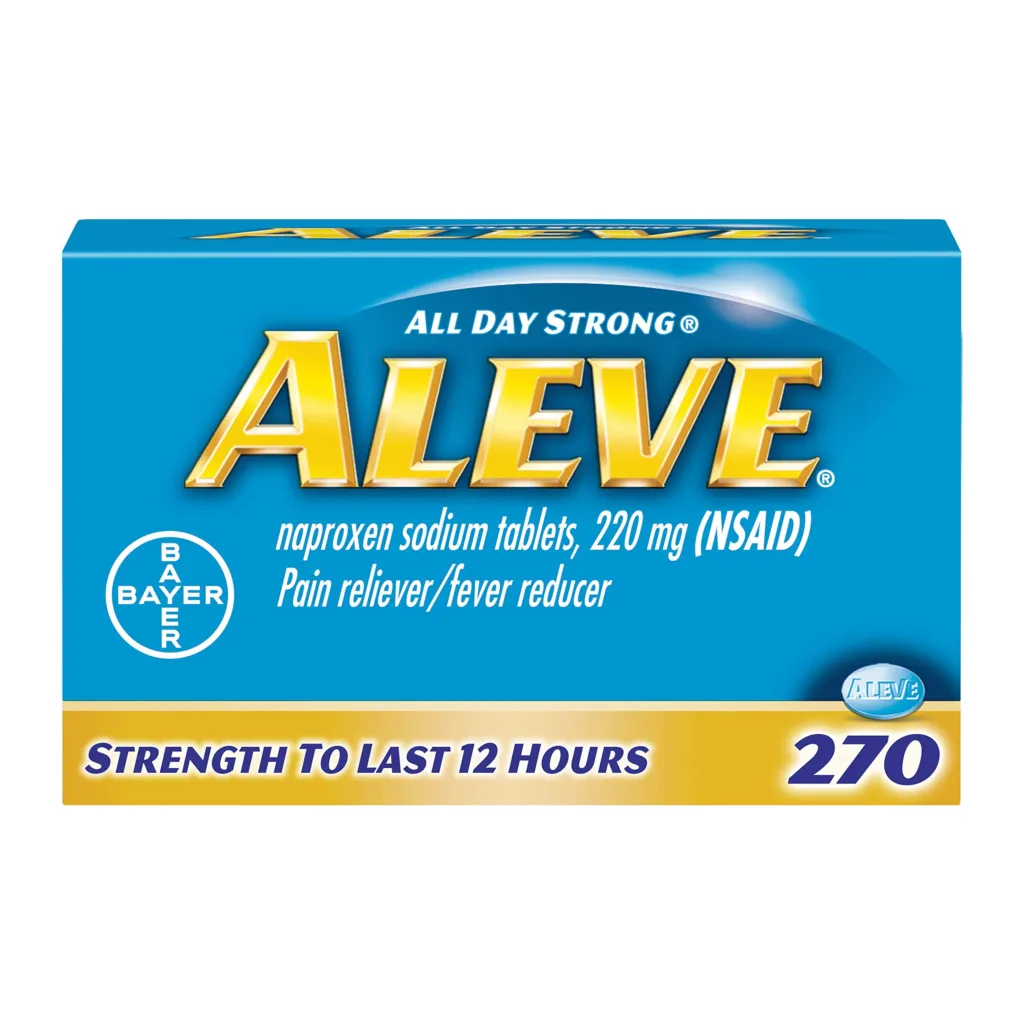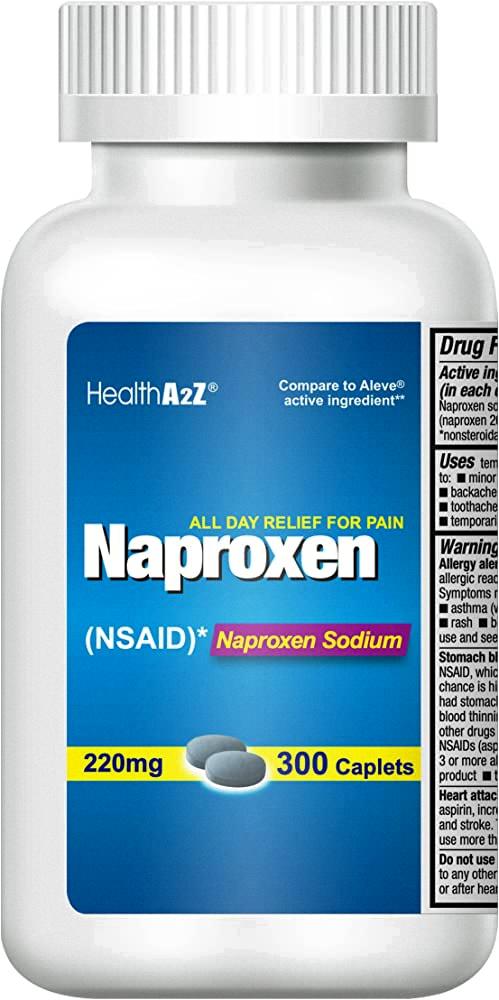Aleve is a popular over-the-counter pain reliever that is commonly used to alleviate symptoms of pain and inflammation. However, many people wonder if Aleve is a blood thinner and if it can cause blood thinning side effects.
To answer this question, Aleve is not classified as a blood thinner. It belongs to a class of drugs called NSAIDs (nonsteroidal anti-inflammatory drugs) and works by reducing the production of certain chemicals in the body that cause pain and inflammation.
While Aleve does not directly thin the blood, it can still have an impact on your blood clotting time. Just like other NSAIDs, Aleve can slow down the clotting process, which means that it may take longer for your blood to clot when you have an injury or cut.
For most people, this shouldn’t be a problem. However, if you are taking a blood thinner like warfarin or have a bleeding disorder, it is important to talk to your doctor before taking Aleve. They may advise you to avoid usig Aleve altogether or to monitor your blood clotting time more closely while taking it.
It’s also worth noting that Aleve can increase the risk of certain side effects, including stomach ulcers, bleeding, and kidney problems. To reduce your risk of these side effects, it’s important to take Aleve as directed and to avoid using it for long periods of time.
Aleve is not classified as a blood thinner, but it can still affect your blood clotting time. If you have any concerns about taking Aleve, talk to your doctor or pharmacist before use. They can help you understand the risks and benefits of using Aleve and can recommend alternative pain relief options if needed.
Does Aleve Affect Blood Thickness?
Aleve, also known as naproxen, is a nonsteroidal anti-inflammatory drug (NSAID) that is commonly used for pain relief and reducing inflammation. Aleve is not considered a blood thinner, but it does have antiplatelet effects, which means it can slow down blood clotting. Specifically, Aleve inhibits the production of thromboxane, a substance that promotes platelet aggregation and blood clotting. This effect can be beneficial for individuals who are at risk of blood clots, such as those with a history of heart attack or stroke. However, it can also increase the risk of bleeding, especially if tken with other blood-thinning medications or in high doses. It is important to always follow the recommended dosage and talk to your doctor before taking Aleve or any other medication.

Source: creakyjoints.org
The Effects of Aleve and Tylenol on Blood Thickness
Aleve (naproxen) is a nonsteroidal anti-inflammatory drug (NSAID) that works by inhibiting the production of prostaglandins, which are chemicals that cause pain and inflammation in the body. Although Aleve is not classified as a blood thinner, it can have an effect on blood clotting, and prolonged use of high doses of Aleve may increase the risk of bleeding. Therefore, it is important to consult with a healthcare provider before using Aleve if you are taking blood-thinning medications or have a bleeding disorder.
On the other hand, Tylenol (acetaminophen) is not classified as a blood thinner-type of drug, and it does not have an effect on blood clotting. Tylenol works by blocking the production of cerain chemicals in the brain that cause pain and fever. It is considered safe for use in most patients, including those who are taking blood-thinning medications like warfarin.
In summary, Aleve can have an effect on blood clotting, while Tylenol does not. It is important to talk to your healthcare provider before using any medication, especially if you are taking other medications or have a medical condition that may be affected by the medication.
Are Advil and Aleve Blood Thinners?
Advil and Aleve are not blood thinners, but they are in a class of drugs called NSAIDs (nonsteroidal anti-inflammatory drugs), which can affect the way your blood clots. NSAIDs work by reducing the production of cerain chemicals in the body that cause inflammation, pain, and fever. This can make the blood less likely to clot as quickly, which can increase the risk of bleeding.
However, NSAIDs are not as potent as true blood thinners such as warfarin, heparin, or aspirin. If you are taking a blood thinner or have a bleeding disorder, it is important to talk to your doctor before taking Advil, Aleve, or any other NSAID. Your doctor may recommend an alternative pain reliever that is safer for you to take.
Are Aspirin and Aleve Blood Thinners?
Yes, aspirin is a blood thinner. It works by inhibiting the production of certain substances in the body that cause blood to clot. This property of aspirin makes it useful in preventing heart attacks and strokes in people with a high risk of developing these conditions. However, aspirin can also increase the risk of bleeding, especilly if taken in large doses or for a long time. Therefore, people with any kind of bleeding disorder or undergoing surgery should avoid taking aspirin without consulting their doctor.
On the other hand, Aleve is not primarily a blood thinner, but it has anti-inflammatory properties that can reduce pain and swelling. Aleve contains naproxen, which belongs to a class of drugs called nonsteroidal anti-inflammatory drugs (NSAIDs). While NSAIDs do not directly thin the blood, they can affect the blood’s ability to clot by reducing the production of certain enzymes in the body. This can increase the risk of bleeding, especially in people with a history of bleeding disorders or taking blood-thinning medication. Therefore, it is important to use Aleve only as directed and consult a doctor before taking it if you have any underlying medical conditions.
Does Aleve Increase Bleeding?
Yes, Aleve (naproxen) and oter non-steroidal anti-inflammatory drugs (NSAIDs) can cause you to bleed more. NSAIDs work by blocking the production of certain chemicals in your body that cause inflammation, pain, and fever. However, these same chemicals also play a role in blood clotting. When you take NSAIDs, your blood may not clot as well, which can increase your risk of bleeding. It is important to speak with your doctor before taking any medication, including over-the-counter NSAIDs like Aleve, to determine if it is safe for you to take and to discuss any potential risks or side effects. If you have a bleeding disorder or are taking blood-thinning medications, you should avoid NSAIDs altogether.

When Is It Not Safe to Use Aleve?
There are cerain situations when you should avoid using Aleve. If you have a known allergy to naproxen or any other nonsteroidal anti-inflammatory drugs (NSAIDs), then you should not use Aleve. Additionally, if you have a history of gastrointestinal bleeding or ulcers, you should avoid using Aleve as it can increase the risk of bleeding. Individuals with a clotting disorder or anemia should also avoid taking Aleve, as it can further increase the risk of bleeding. Those with systemic mastocytosis, a rare condition in which mast cells in the body are overactive, should not use Aleve as it can trigger severe allergic reactions. Patients with high blood pressure, chronic heart failure, or a history of heart attack should also avoid using Aleve, as it can increase the risk of heart attack or stroke. Finally, individuals with alcoholism should not use Aleve as it can cause liver damage when combined with alcohol. It is essential to consult with your doctor or pharmacist before taking Aleve or any other medications to ensure that it is safe for you.
Pain Relievers That Will Not Thin the Blood
If you are looking for a pain reliever that will not thin your blood, then Tylenol (acetaminophen) is the best option. Unlike other common pain relievers such as aspirin, ibuprofen, and naproxen that contain blood-thinning agents, Tylenol works by blocking pain signals in the brain without affecting your blood’s ability to clot. This makes it a safe alternative for people who are at risk of bleeding or undergoing surgery. However, it is essential to follow the recommended dosage and avoid taking more than the maximum daily limit to prevent liver damage. If you have any concerns or questions about wich pain reliever to take, it is always best to consult your doctor or pharmacist for advice.
Does Aleve Contain Aspirin?
No, Aleve does not contain aspirin. Aleve’s active ingredient is naproxen sodium, which is a nonsteroidal anti-inflammatory drug (NSAID) that works by reducing the hormones that cause inflammation and pain in the body. However, it’s important to note that if you are allergic to aspirin or have a history of stomach ulcers or bleeding disorders, you should talk to your doctor before taking Aleve or any other NSAID. It’s also important to avoid taking aspirin, aspirin-containing products or any other pain reliever/fever reducer with Aleve unless your doctor has specifically instructed you to do so.
Are Naproxen and Aleve Equivalent?
Yes, naproxen is the active ingredient in Aleve. Aleve is a brand name for naproxen, but it is available in a lower dose than prescription-strength naproxen. While naproxen is available as a generic medication, Aleve is a 220 mg tablet that can be taken every 8 to 12 hours, with a maximum daily dose of 2 to 3 tablets. In summary, naproxen and Aleve are essentially the same medication, with Aleve being a lower-dose version of naproxen available as a brand-name product.

Source: amazon.com
Who Should Avoid Taking Advil or Aleve?
Advil and Aleve are both nonsteroidal anti-inflammatory drugs (NSAIDs) commonly used to relieve pain, fever, and inflammation. However, not everyone can take these medications safely. Patients who should not take Advil or Aleve include:
1. Older patients: As people age, their bodies beome more sensitive to the side effects of NSAIDs. Older patients are more likely to suffer from gastrointestinal (GI) side effects such as stomach bleeding and ulcers.
2. Patients with type 2 diabetes: NSAIDs can raise blood sugar levels, which can be dangerous for patients with diabetes. Additionally, patients with diabetes are at increased risk for cardiovascular events, which can be exacerbated by NSAID use.
3. Patients with a history of stomach ulcers: NSAIDs can irritate the stomach lining and increase the risk of bleeding and ulceration. Patients with a history of stomach ulcers should avoid NSAIDs or use them with caution under the supervision of a healthcare provider.
4. Patients with kidney problems: NSAIDs can cause kidney damage, especially in patients with pre-existing kidney disease. Patients with kidney problems should avoid NSAIDs or use them with caution under the supervision of a healthcare provider.
5. Patients at risk for heart disease: NSAIDs can increase the risk of heart attack and stroke, especially in patients with pre-existing heart disease or risk factors such as high blood pressure, high cholesterol, or smoking. Patients at risk for heart disease should avoid NSAIDs or use them with caution under the supervision of a healthcare provider.
In summary, patients who are older, have type 2 diabetes, a history of stomach ulcers, kidney problems, or are at risk for heart disease should avoid taking Advil or Aleve unless directed by a healthcare provider. It is important to always read the label and follow the recommended dosage and duration of use. If you have any questions or concerns, talk to your healthcare provider before taking any medication.
The Effects of Aleve on Blood Clotting
Aleve is a nonsteroidal anti-inflammatory drug (NSAID) that contains the active ingredient naproxen sodium. NSAIDs like Aleve work by inhibiting the production of prostaglandins, which are substances in the body that cause inflammation, pain, and fever.
Although Aleve can reduce inflammation and pain, it can also have an effect on blood clotting. NSAIDs can interfere with the function of platelets, which are blood cells that help the blood to clot. This effect can increase the risk of bleeding, especially if a person is taking other medications that also affect blood clotting.
Therefore, it is important to talk to a healthcare provider before taking Aleve or any other NSAID, paricularly if you have a history of bleeding disorders, are taking blood thinners, or have recently had surgery. Your healthcare provider can help you weigh the benefits and risks of taking Aleve and determine if it is safe for you to use.
Medications That Thin the Blood
Anticoagulants and antiplatelets are the two types of medications that are commonly used to thin blood. Anticoagulants, such as heparin or warfarin, work by slowing down the process of blood clot formation in the body. These medications are often used to prevent or treat conditions such as deep vein thrombosis, pulmonary embolism, and stroke. Antiplatelets, such as aspirin and clopidogrel, work by preventing blood cells called platelets from clumping togethr and forming a clot. These medications are often used to prevent heart attacks and strokes in people who have a high risk of developing these conditions. It is important to note that these medications should only be used under the guidance and supervision of a healthcare professional, as they can have potentially serious side effects and interactions with other medications.
Does Aleve Increase the Risk of Bleeding Like Aspirin?
Yes, Aleve (naproxen) is a non-steroidal anti-inflammatory drug (NSAID) just like aspirin and can cause bleeding. NSAIDs work by inhibiting certain enzymes that produce prostaglandins, which are responsible for inflammation and pain. However, prostaglandins also help protect the lining of the stomach and intestines from damage. When NSAIDs inhibit these enzymes, they can cause irritation and even ulceration of the stomach and intestinal lining, leading to bleeding. It is important to talk to your doctor before taking any medication to understand the potential risks and benefits for your specific situation.
The Effects of NSAIDs on Blood Thickness
Yes, all NSAIDs can have an effect on the blood and can potentially thin it. While some NSAIDs, such as aspirin, are known to have a stronger impact on blood clotting time, even milder NSAIDs like ibuprofen can slow down the clotting process. This means that if you have an injury or a cut, bleeding may take longer to stop while taking NSAIDs. It’s essential to talk to your doctor or pharmacist if you are taking any NSAIDs to understand the potential risks and benefits and to follow the recommended dosage and usage instructions.

Is Naproxen a Blood Thinner?
Yes, naproxen is considered a blood thinner. It belongs to a class of medications knwn as nonsteroidal anti-inflammatory drugs (NSAIDs), which work by inhibiting the action of enzymes that promote inflammation and blood clotting. This action of naproxen can lead to a reduction in the ability of blood to clot, making it a blood thinner. However, it is not as potent as medications like aspirin or warfarin, which are specifically designed to thin the blood. It is important to note that taking naproxen along with other blood-thinning medications can increase the risk of bleeding complications. Therefore, it is recommended to consult with a healthcare provider before taking naproxen or any other medication.
Conclusion
In conclusion, Aleve is a nonsteroidal anti-inflammatory drug (NSAID) that is commonly used to relieve pain and inflammation. It works by blocking certain enzymes in the body that cause pain and inflammation. While Aleve is generally considered safe and effective, it may cause side effects such as stomach upset, dizziness, and increased risk of heart attack or stroke. Additionally, Aleve may increase the risk of aseptic meningitis in patients with lupus. It is important to talk to your doctor before taking Aleve, especially if you have any underlying medical conditions or are taking other medications. It is also important to follow the recommended dosage and not exceed the maximum daily limit to avoid potential side effects.
